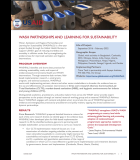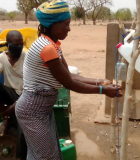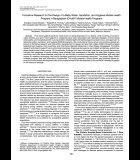Marketing Innovations for Health (MIH)
The goal of the Marketing Innovations for Health (MIH) Project, supported by the U.S. Agency for International Development (USAID), is to “Contribute to sustained improvements of the health status of women and children in Bangladesh by increasing access to and demand for essential health products and services through the private sector.” Project funding includes $15.0 million in federal cash funds, provision of contraceptive commodities expected to generate $2.2 million for program use, and $112.3 million in cost share. This project builds on the long relationship between USAID, SMC and PSI to develop social marketing in Bangladesh, heralded as “one of USAID’s greatest success stories of sustainability and sustainable development,” and previous USAID-funded work to improve private sector health care, particularly among non-formal practitioners providing primary health care services.
Activity Description
The project design includes three components: (1) commodity sales and distribution through private networks nationwide; (2) community mobilization and BCC in 19 priority districts through subcontracts with the national NGOs listed above, and (3) capacity-building for the private sector networks, in partnership with EngenderHealth. While activities under components one and three are country-wide, component two is implemented in 19 priority3 districts in Barisal, Chittagong, Dhaka and Sylhet Divisions. The program aims to reach 6.3 million married women of reproductive age (MWRA), 3.8 million caregivers of children under 5, 1.6 million husbands of MWRA, and 0.7 million adolescents with health promotion and information about products.
Expected Outcomes
• expand and develop private provider networks as sales outlets
• reach targeted populations with key health messages
• sell SMC’s essential health, nutrition and hygiene products
Actual Outcomes
• The number of active Blue Star providers (BSPs), of whom a majority are practicing in municipalities, 4 has been increased to a total of 6,324–surpassing the project target of 6,000.
• The project is on target to train 1,580 private community health providers (PCHP), the majority located in semi-urban areas in the priority districts





